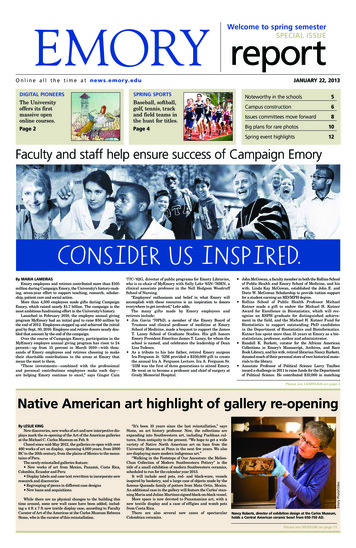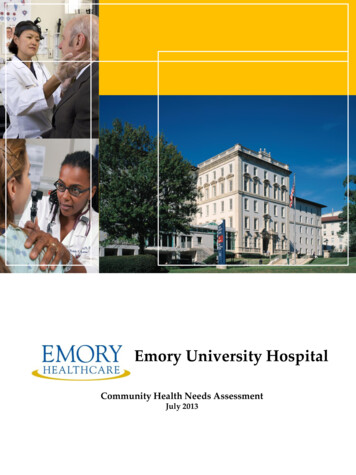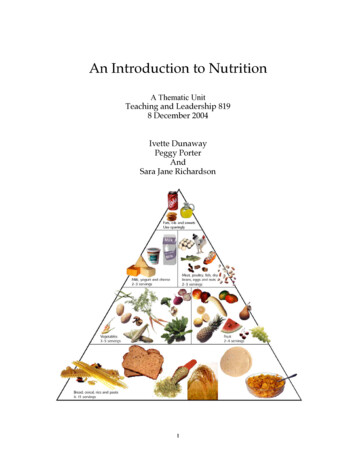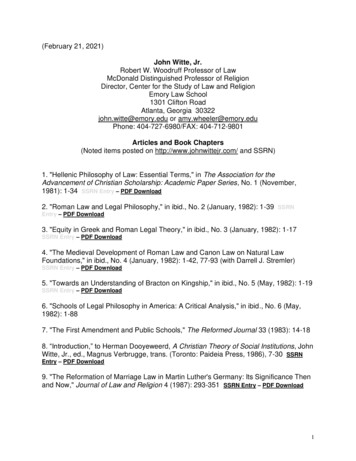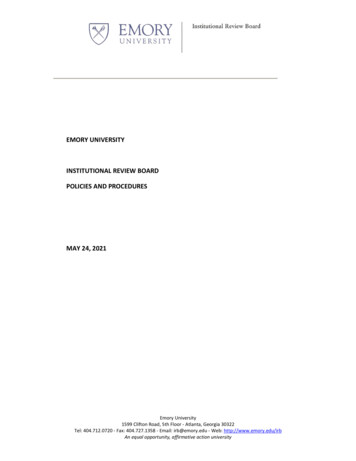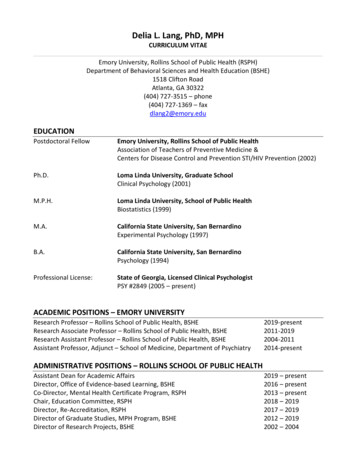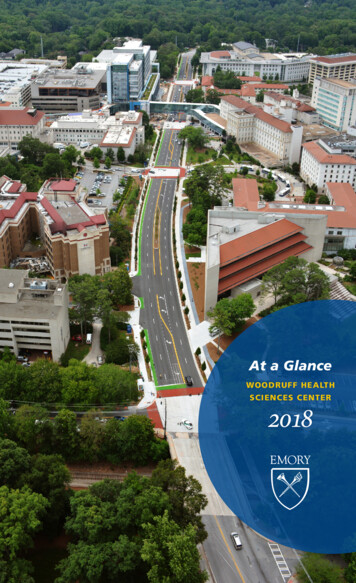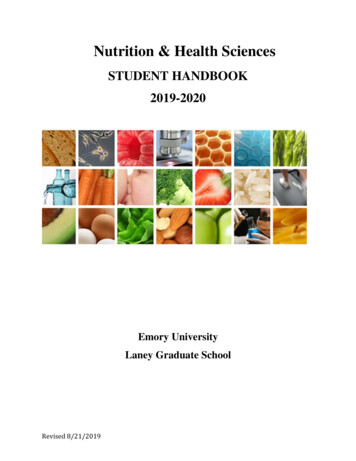
Transcription
Nutrition & Health SciencesSTUDENT HANDBOOK2019-2020Emory UniversityLaney Graduate SchoolRevised 8/21/2019
NHS HandbookNHS PROGRAM ADMINISTRATIONProgram DirectorUsha Ramakrishnan, PhDDept. of Global Health7009 Claudia N Rollins404-727-1092uramakr@emory.eduDept. of PediatricsHealth Sciences ResearchBldg. Suite W440,RmW450 (on bridge)404-727-9930mvos@emory.eduDept. Global Health7053 Claudia N Rollins404-712-1902mbweber@emory.eduDept. of Hematology andMedical OncologyDept. of Epidemiology404-727-2671rmbosti@emory.eduReynaldo Martorell, PhDDept. of Global Health5005 Claudia N Rollins404-727-9854rmart77@emory.eduVicky Stevens, ScDStrategic Director,Laboratory Services,American Cancer Society404-329-5197victoria.stevens@cancer.orgKM Venkat Narayan, MD,MSc, MBADept. of Global Health7040 Claudia N Rollins404-727-8402knaraya@emory.eduCria Perrine, PhDDivision of Nutrition,Physical Activity, andObesity Health, CDC770-488-5183cperrine@cdc.govAryeh Stein, PhD, MPHDept. of Global Health7007 Claudia N Rollins404-727-4255aryeh.stein@emory.eduAmy Webb Girard, PhDDept. of Global7021 Claudia N Rollins404-727-8807awebb3@emory.eduJean Welsh, PhD, MPH, RNDept of PediatricsHealth Sciences ResearchBldg. Suite W450404-712-5048jwelsh1@emory.eduDirector of Graduate StudiesMiriam Vos, MD, MSPHRecruiterMary Beth Weber, PhD, MPHExecutive Committee MembersRoberd Bostick, MD, MPHThomas Ziegler, MD, MSDept. of MedicineGG23 Emory Hospital2404-727-7351tzieg01@emory.edu
NHS HandbookJessica Alvarez, RD, PhD,Program AdministratorJoan LynfattDept of EndocrinologySOM, WMRB 1313404-727-1390jessica.alvarez@emory.eduDept. of Global Health7000J Claudia N Rollins404-727-5552jalynfatt@emory.edu3
NHS HandbookTable of ContentsProgram Overview. 6Coursework . 7Core Curriculum . 7Electives . 8Grading Criteria . 9Example Schedule. 10Research Rotations . 11Overview . 11Requirements . 11Research Rotation Proposal . 12Research Rotation Final Report . 13Teaching Requirements. 14Overview & Requirements . 14TATTO Credit . 15Teaching Assistant and Associate Positions . 15Nutrition and Health Sciences Seminar . 16Credit Requirements for Graduation . 17NHS Student Milestones. 18Master of Science (M.S.) Equivalency Exam . 18Choosing a Thesis Advisor . 18Forming a Thesis Advisory Committee. 19Preliminary Thesis Proposal . 20General Doctoral Exam (Advancement to Candidacy) . 20Documenting NHS Student Progress-The Annual Progress Report . 22Individual Development Plan (IDP) . 23Ph.D. Thesis Dissertation. 24Degree Completion . 24Commencement . 24Graduate Student Travel . 25Travel Safely and Let Emory Know . 25Purchasing Travel with Emory Funding. 25Withdrawal, Leave of Absence, Parental Accommodation . 26Withdrawal . 26Leave of Absence . 26Parental Accommodation . 26Honor, Conduct and Grievance Policies . 264
NHS HandbookAppendix A: Teaching Assistantship . 27Appendix B: Teaching Associateship . 28Appendix C: Assistant Instructorship . 31Appendix D: Proposal Defense- Policy and Guidelines for Implementation . 32Appendix E: Useful Websites, Fellowship and Grant Information . 365
NHS HandbookProgram OverviewNutritional Sciences has entered a renaissance with the increased recognition of the role ofnutrition in disease prevention and health maintenance. The goal of the Doctoral Program inNutrition and Health Sciences (NHS) is to provide students with the necessary skills toinvestigate the relationship between nutrition and human health, especially with respect to theprevention and control of nutritional problems and related diseases. This includes, at a basiclevel, knowledge of how nutrients participate in biochemical processes and affect molecularevents such as control of gene expression. At a population level, goals include a betterunderstanding of the causes and consequences of variations in nutritional intakes and status inorder to improve dietary practices and to enhance health on a national and international level.The program integrates the fields of nutrition and public health sciences because many of theimportant questions of human health involve the interface between these disciplines.The program encompasses two major facets of modern nutrition: molecular/cellular approachesand population/epidemiologic approaches. By combining the expertise of scientists at EmoryUniversity, the U.S. Centers for Disease Control and Prevention, the American Cancer Society,CARE USA, local universities and other organizations in the metro-Atlanta community, trainingis obtained with an integrative perspective. Faculty and students are generally identified with oneor two areas of emphasis; however, collaboration among members is facilitated by sharedseminars, joint teaching and research.The Doctoral Program in Nutrition and Health Sciences is a non-departmental program affiliatedwith the Public Health Sciences cluster of doctoral programs within the Laney Graduate School.Completion of the Ph.D. program normally requires at least four years.PhD in Nutrition and Health Sciences CompetenciesUpon completion of the PhD degree, graduates will be able to: Apply the fundamentals of nutrition science including methods of nutrition assessment.Evaluate scholarly work, programs and interventions including work completed by peersin nutrition health sciences.Conduct independent research using appropriate research design and methods in the fieldof nutrition.Communicate current knowledge about key concepts in human nutrition science tostudents and peers.Develop the skills needed to teach students about nutritional science and health.6
NHS HandbookCourseworkCore CurriculumEntering NHS students take required coursework during the first year. Students also participatein the NHS Seminar and start lab rotations. In consultation with the DGS, entering NHS studentsmay petition to waive or substitute some Core Courses for electives on a case-by-case basis.Required core courses include: NHS580/GH548: Human Nutrition 1 - (Year 1 - Fall) NHS 581/GH549: Human Nutrition 2 - (Year 1 - Spring) EPI530: Epidemiology 1 (with lab) – (Year 1 Fall) BIOS500: Biostatistics 1 (with lab) – (Year 1 Fall) GH545: Nutritional Assessment - - (Year 1 - Spring) NHS570: Introductory Graduate Seminar (1 year, Fall & Spring) NHS790: Advanced Graduate Seminar (2 years, Fall & Spring ) PUBH701: Translational and Interdisciplinary Public Health (Year 1 Fall) PUBH 700* ( Year 1 Fall) JPE600: Jones Program in Ethics Core Seminar (During Orientation)*hybrid course that is required for students without an MPHThe NHS core curriculum is designed to provide broad expertise in several aspects of nutrition,including: Basic understanding of the molecular mechanisms underlying normal and abnormal cellphysiology and how nutrition may affect these pathways Approaches to the development of new indices for assessing nutritional status and/orexposure to environmental toxins, etc. Epidemiological studies and intervention trials to understand how nutrients relate todisease Clinical studies to identify the role and mechanism of actions of nutrients in diseaseprevention, treatment, and rehabilitation An understanding of these factors in the context of national and international issues ofpublic health.All students in years two and beyond will have a customized set of electives, agreed upon by thestudent, thesis mentor, and Director of Graduate Studies that will provide the appropriatebackground for their thesis work (see next section). These electives may be taken from therelevant offerings of any of the graduate or professional programs at the University. In addition,students are required to take the graduate seminar class for a total of 3 years (1 year at theintroductory level and 2 years at the advanced level). Graduate School required courses inScholarly Integrity and in teaching methods are taken during inter-sessions. A full time courseload, considered 9 credit hours or more per semester, is required for all NHS students.Students should register for at least 9 credit hours during the summer term. These can be coursesoffered during the summer, rotation research credits or graduate research (599R if not yet incandidacy and 799R if in candidacy.)7
NHS HandbookWhile students may enter the Program with interest in a specific area of emphasis, the nature ofthe first year’s curriculum is designed to encourage students to explore different areas ofnutrition and health sciences. During the first year, students take formal course work andparticipate in seminars, discussion groups, and lectures by faculty members and/or visitingscientists. They will be exposed to the basic principles of statistical analysis and epidemiologicalresearch. They may also begin research by working with different faculty members as part of theResearch Rotation requirements. By the end of the second year, the student should be ready toidentify an area of research. The student should also be in a position to identify a faculty memberto serve as the thesis advisor for the PhD research.Meetings with the Director of Graduate Studies and/or the Program Director are usuallyscheduled at the end of Year 1 and of Year 2 to discuss the progress of the graduate studies andto review the recommendations for electives.ElectivesStudents are required to take at least 4 graduate level elective courses (usually in years 2 - 3),totaling at least 12 credit hours. Suitable electives may be selected to prepare the student forindependent research. Additional courses may be taken in other fields, such as chemistry,genetics, immunology, biostatistics and epidemiology. The graduate student, in consultationwith the Thesis Advisor, committee and the Program Director/DGS, selects the electives thatwould best serve his/her long-term goal. Courses can be selected from the Laney GraduateSchool, Rollins School of Public Health, or Departments from other colleges within EmoryUniversity. Students may also cross-register for courses at neighboring institutions through theAtlanta Regional Council for Higher Education (ARCHE) program. More details about theARCHE program may be found at the Emory ARCHE html).The following example electives have been recommended by previous NHS students: Nutrition-related:o GH551: Diet and Chronic Diseaseo GH523: Frontiers in Obesity Research and Preventiono GH552: Global Elimination of Micronutrient Malnutritiono GH568: Community Engaged Food Securityo NHS 700R – Nutritional Metabolomics Epidemiology/biostatistics:o EPI534: Epidemiology 2 (with lab)o BIOS501: Biostatistics 2 (with lab)o EPI740: Epidemiologic Modelingo EPI750 or BIOS502 : Longitudinal Data Analysiso EPI591U: Applications of Epidemiologic Conceptso EPI537: Epidemiology of Chronic Diseaseo EPI591L: Assessment of Dietary Intakeo BSHE732: Structural Equation Modeling Othero EPI730: Grant Writing8
NHS HandbookGrading CriteriaThe grading scale in the Graduate School ranges from A (4.0) to C (2.0) and F (0); there is no Dgrade. Some courses may be taken on a Satisfactory / Unsatisfactory (S/U) basis with instructorapproval. Students in the graduate program are expected to maintain an overall average of B(3.0) or better. A grade less than B in the core courses (including: NHS 580, NHS 581, BIOS500, BIOS 501, EPI 530, EPI 534, and GH 545 as applicable) may be cause for placement onacademic probation.A grade of “Incomplete” must be corrected within a 12-month period or the Registrar willautomatically change the grade to an “F”. It is the responsibility of the student to make thenecessary arrangements to complete the course and have the grade changed. A full course load (aminimum of 9 credit hours) is required independent of the number of credit hours to be repeatedfor the removal of an “I” grade.A student who has a grade point average below 3.0 at the end of a semester or who receives a“C” or “F” in any course will be placed on academic probation for that semester. Financialsupport may be withdrawn until the grade point average is raised to 3.0 or better.Students with academic probation for two consecutive semesters may be subject to dismissalupon review by the NHS Executive Committee. Also, a student who receives a “C” or “F” in twoor more courses in a given semester may be subject to immediate dismissal from the program.9
NHS HandbookExample ScheduleYear 1- FallCourse NumberCourse TitleCreditsNHS 580/GH548Human Nutrition 16NHS 570RIntro Graduate Seminar1EPI 530Epidemiology 1 Lab4BIOS 500Biostatistics 1 Lab4JPE 600 - Jones Program in Ethics course is generally taken in August prior to the start of the semester. Moreinformation at: ndex.html hd/jpe.htmlCourse NumberNHS 581/GH 549NHS 570RGH 545EPI 534BIOS 501NHS 597RYear 1- SpringCourse TitleHuman Nutrition 2Intro Graduate SeminarNutritional AssessmentEpidemiology 2 LabBiostatistics 2 LabResearch RotationsCredits61334Credits vary*Year 1- SummerCourse TitleCreditsResearch Rotation(s)Credits vary*Graduate ResearchCredits vary*The Master’s Equivalency Exam is generally taken in June or July.TATT 600 - Teaching Assistant Training is generally taken in August prior to the start of the semester. Moreinformation at: ing/index.html hd/tatto.htmlCourse NumberNHS 597RNHS 599RCourse NumberNHS 790RNHS 597RNHS TATT605--Year 2- FallCourse TitleAdvanced Graduate SeminarResearch Rotation(s)TATTO Teaching Assignment**Elective CoursesCourse NumberNHS 790RNHS 597RNHS TATT 605NHS 699RYear 2-SpringCourse TitleAdvanced Graduate SeminarResearch Rotation(s)TATTO Teaching Assignment**Advanced Graduate Research***Course NumberNHS 799RNHS 597RYear 2-SummerCourse TitleGraduate ResearchResearch RotationsNHS 790RNHS 799R--Years 3 and beyond (Fall & Spring)Advanced Graduate SeminarAdvanced Graduate/ Dissertation ResearchElective Courses10Credits1Credits vary*Credits vary*Credits vary*Credits1Credits vary*Credits vary*CreditsCredits vary*Credits vary*1Credits vary*Credits vary*
NHS Handbook*Credits vary for research rotations, teaching assignments and electives. Each semester, students must maintain full-timestatus of 9 credits**Teaching Assignment may be in the first or second semester***Credit for Advanced Graduate Research may be taken as needed for pre-candidacy work towards the dissertation. Creditsvary 1-9. The Mentor should confirm the correct amount of hours the students should carry.Research RotationsOverviewResearch rotations are an integral part of the NHS program. One purpose of the research rotationis to expose students to current research in several different nutrition-related disciplines, thusallowing them to make a more informed decision about which area of emphasis in the Programthey wish to pursue. A second purpose is to assist the student in deciding on a mentor byproviding an opportunity to sample the research environment, assess the available researchprojects, and determine if the mentor will be suitable as a Ph.D. advisor.RequirementsEach student is required to complete 3 research rotations. Ideally, these should be completed bythe end of the summer of the second year in the program. An additional (4th) rotation may becompleted if needed. Independent of the area of emphasis, at least one of the rotations mustinvolve hands-on translational/clinical/laboratory/omics experience of primary data acquisitionand at least one must deal with study design and/or statistical analysis (typically considered“epidemiology-related”.) The third rotation can be translational/clinical/lab or epidemiologyrelated.Definitions: Translational, clinical, laboratory or “omics” research rotation: involves primary datacollection or measurement. For “omics” rotations, some practical experience in sampleacquisition or processing should be included along with experience analyzing data. Epidemiology research rotation: involves writing a grant, developing a protocol,statistical analysis, or DGS-approved epidemiology experienceEach rotation is coordinated with individual faculty members selected by the student and usuallyinvolves a time commitment of approximately 10 hours per week for a semester or 3-4 months.A typical research rotation should be equivalent to a course of 3 credit hours. Students who areplanning to work more than 15 hours a week may be advised to register for more credit. Creditsin excess of 3 per rotation should not be in lieu of course credits, but can be used to meet theminimum of 12 credits per semester. Note: Rotations do not need to formally start at thebeginning of a semester, but students can only earn credits once per research rotation (e.g. arotation from November to March must be registered for credits in either the Fall or Springsemester).Coordinating research rotations may be a lengthy process and requires planning ahead.Research rotation opportunities are periodically circulated through the NHS listserv, however,11
NHS Handbookstudents are encouraged to connect with researchers in the NHS program with similar researchinterests to identify rotation opportunities. It can take several months to set up a rotation soplanning should begin well before the intended start date. Rotations can be started in the FallSemester of the first year, and should be started by the Spring Semester of the first year.Students intending to begin a research rotation in the Fall Semester of the first year areencouraged to contact faculty members the summer prior to beginning at Emory.For the rotations, at least two should be supervised by a NHS faculty (full or adjunct) and at leastone by a full time faculty member of the program. For faculty members outside the LaneyGraduate School, permission should be requested from the DGS in advance of submitting arotation proposal. It is expected that the rotations will be with 3 different mentors to expand thestudent’s exposure to mentors and types of research. At the most, no more than 2 rotationsshould be completed with the same mentor.Research Rotation ProposalThe research rotation should be structured as an investigation of a scientific problem in which aspecific hypothesis is addressed. The ideal research rotation combines technical training, theacquisition of skills (e.g., laboratory or computer), exposure to a research area and the process ofanswering a scientific question. The scientific goals of the research rotation should bedefined by the student in a 1-2-page proposal of the project to be submitted within 2 weeksof the start date of the rotation. The proposal should follow the format below and state theexpected product of the rotation. The product is expected to be either an article, part of anarticle, grant or technical document. Some exceptions are made on a case by case basis to thisrequirement. Previous examples of research rotation proposals can be requested from NHSstudent representatives or the DGS.The 1-2 page research rotation proposal should follow this format:1. Type of rotation2. Type of research (Bench lab work, clinical research, systematic literature review,Epi/statistical data analysis, primary data collection, policy analysis, program evaluation)3. Background Significance of the subject area (3-5 sentences) Objective of the work4. Specific Aims (1 or 2 detailed statements of the questions to be answered and scientifichypothesis being tested if applicable)5. Contemplated Approach Methods Source of samples/ subjects (if applicable)6. Expected Final Product (grant, portion of paper or paper, technical document)7. Timeline12
NHS HandbookThe rotation proposal has to be approved by the DGS who will provide feedback includingclarifying the type of rotation and suitability of the expected final product.Research Rotation Final ReportA report summarizing the work accomplished should be submitted to the DGS at the end of therotation. An email with the grade of the rotation should be sent by the supervising facultymentor to the DGS. The report should include at least: A one page, single spaced, abstract appropriate for the field of research A paragraph describing the activities completed, skills practiced and knowledgegained A timeline of any future products expected from the work (papers, grants,abstracts) and the role of the student in that workIf the student prepares a first author paper/technical report by the end of the rotation, this may besubmitted instead of the expanded abstract. Generally, the expanded abstract should include atleast the following sections: Background, Methods, Results, and Discussion. A second pageshould include detailed results (1-2 figures and/or tables) and references if necessary. Clarityand comprehensiveness are encouraged to meet abstract length requirements.The final research rotation report should be submitted within one month of the end of the rotationexperience. Note: work related to the research rotation (e.g. preparation of a manuscript orposter abstract) may continue after completion of the 3-6 month rotation experience. If there areother anticipated rotation products, the timeline for completion of ongoing projects should bedescribed in the final report.A final grade for the research rotation may not be recorded if the rotation report is incomplete. Agrade of “Incomplete” will be automatically assigned for the Research Rotation for that term ifthe report is not submitted before the end of the semester. It will be the responsibility of thestudent to have the correct grade changed before the Registrar automatically changes it to an “F”.13
NHS HandbookTeaching RequirementsSee also Appendices A-COverview & RequirementsThe TATTO (Teaching Assistant Training and Teaching Opportunity) Program is administeredby the Laney Graduate School to provide teacher training and experience for doctoral students inthe Graduate Program in Nutrition and Health Sciences (NHS).The four stages of the TATTO program (outlined below) provide students with credible trainingand optimal teaching experience, while ensuring that they are not overtaxed with teachingresponsibilities. With few exceptions, no student may serve more than a total of four semesters inany combination of teaching assistant and associates positions during his or her first four years atEmory. TATTO requirements must be completed before applying for candidacy.1. The first stage of TATTO is a short teaching workshop offered in late summer. It shouldbe taken immediately prior to a student’s first teaching experience, generally followingthe first year of graduate study at Emory. Faculty for this course are drawn from amongthe best teachers across the university. The syllabus covers general topics of importanceto all students, including syllabus writing and grading, lecturing and leading discussions,the use of writing as a pedagogical tool, the conduct of lab sessions, and the use of newtechnologies in the classroom. Because the summer course is offered between semesters,it is credited to a student’s transcript the following fall when students register for TATT600. TATT 600 must be taken prior to the assistantship and associateship.2. In the second stage, programs provide training that addresses intellectual problems andteaching strategies from the perspective of particular disciplines. Students register for theprogram-teaching course, offered as a regular course through the Registrar’s courselistings. Optimally, students enroll in this course at the same time they participate in theirfirst teaching opportunity, the teaching assistantship.3. The teaching assistantship, the third stage of the TATTO program, varies from programto program. The defining characteristic of the teaching assistantship is a controlled,carefully monitored initial teaching opportunity. A faculty member who providescontinuing guidance and evaluation closely supervises the teaching assistant. The studentregisters for TATT 605 during the semester of the teaching assistantship.4. Optional: The teaching associate position, the fourth stage of the TATTO program,advances the student to a teaching opportunity with greater responsibilities. The LaneyGraduate School favors a co-teaching model for this stage, one in which the student and afaculty member collaborate in all aspects of a course, from syllabus design to finalgrading. In many programs, graduate teaching associates are largely responsible forteaching a course of their own design. In all cases, teaching associates can expectattentive mentoring and evaluation. Students register for TATT 610 during the semesterof the teaching associate position. (Note: Not all students in science programs participatein the fourth stage of TATTO.)14
NHS HandbookStudents who demonstrate exceptional teaching ability may be eligible to apply for appointmentas Dean’s Teaching Fellows. To be eligible for consideration, a student must have completed allLaney Graduate School and program requirements except the dissertation and must have beenadmitted to PhD candidacy. Dean’s Teaching Fellows have complete responsibility for thecourse or courses they teach. The Laney Graduate Scho
mbweber@emory.edu Executive Committee Members Roberd Bostick, MD, MPH Dept. of Hematology and Medical Oncology Dept. of Epidemiology 404-727-2671 rmbosti@emory.edu Reynaldo Martorell, PhD Dept. of Global Health 5005 Claudia N Rollins 404-727-9854 rmart77@emory.edu Vicky Stevens, ScD Strategic Director, Laboratory Services,
